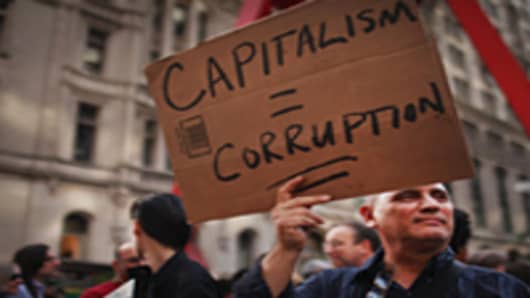Corporate and political leaders, many of whom have been the target of growing worldwide protests, are lining up to say how much they understand public anger over economic inequality and the financial system.
Executives took pains on Monday to acknowledge the criticism, even as Citigroup and Wells Fargo , two of the biggest US banks, reported double-digit profit increases.
“I understand some of the angst and the anger. This downturn has been too long, unemployment is too high, and people are hurting. We get that,” said John Stumpf, Wells Fargo chief executive, on a conference call announcing that the nation’s largest bank by market capitalisation had recorded a record $4.1 billion quarterly profit.
On Monday, a Quinnipiac University poll found two-thirds of registered New York City voters agreed with protesters’ views. Asked about regulation of the financial system, 73 percent agreed laws should be tougher.
“New Yorkers, even Republicans, back the Wall Street protesters on at least two things they’re talking about – a get-tough attitude toward banks and Wall Street and continuation of the state’s ‘millionaire’s tax,’” said Maurice Carroll, director of the Quinnipiac University Polling Institute.
Public support for the protest movement is running higher than that for the right-wing Tea Party, according to a recent Time Magazine poll.
Jeff Immelt, the chief executive of General Electric, also weighed in on Monday, saying he understood the anger driving the Occupy Wall Street movement and urging US politicians and business leaders to “try harder” in their efforts to boost exports and create jobs.
“Unemployment is 9.1 percent. Underemployment is much higher than that, particularly among young people that don’t have a college degree,” Mr Immelt, who runs one of the world’s largest industrial conglomerates, said at a Thomson Reuters event in New York.
“It is natural to assume that people are angry and I think we have to be empathetic,” he added in response to a question about the protests.
Mr Immelt insisted that the only way to address public dissatisfaction was to promote economic growth, which would in turn create jobs and allow some of the 250 million around the world seeking work to find employment.
“The only way to solve this specific problem is growth,” he said. “If unemployment comes down, people will feel better. If unemployment goes up, people will feel worse, no matter what goes on Wall Street, no matter what happens with financial reform.”
Still, some bankers continued to distance themselves from the anger directed at the financial sector.
“The protestors shouldn’t be protesting Wall Street, they should be marching on Washington. Everyone is culpable, even going back a president or two before George W. Bush,” said Gilbert Harrison, chief executive of Financo, a boutique bank specialising in retail. He said he was very concerned the protests might turn violent as they spread, leaving the US with a “real revolution” on its hands.
The month-old Occupy Wall Street demonstration, which has been camped out in downtown Manhattan for more than a month, gained traction over the weekend with a wave of similar “occupations” around the world that drew thousands.
Protests in London protest slimmed down from over a thousand at the weekend to a dedicated few hundred on Monday as many people went back to work.
Political leaders have also begun to express sympathy and, in some cases, support for the protests, with Barack Obama, US president, saying on Sunday that Martin Luther King, Jr, the civil rights leader, would have supported challenging “the excesses of Wall Street”.
Republicans and conservative commentators, many of whom had previously criticised the demonstrators as “angry mobs” and accused them of being creations of the Obama administration, have also begun to change course.
On Sunday, Eric Cantor, the second-highest ranking Republican in the House of Representatives, backtracked from his earlier description of protesters as “angry mobs” and said his party recognised the problem of income inequality.
On Monday, Erick Erickson, the editor of the conservative RedState blog, called on the Republican party to find “common ground” with the movement.
“The time is right for a Republican candidate to take up the cause of populism against Wall Street,” he wrote.


